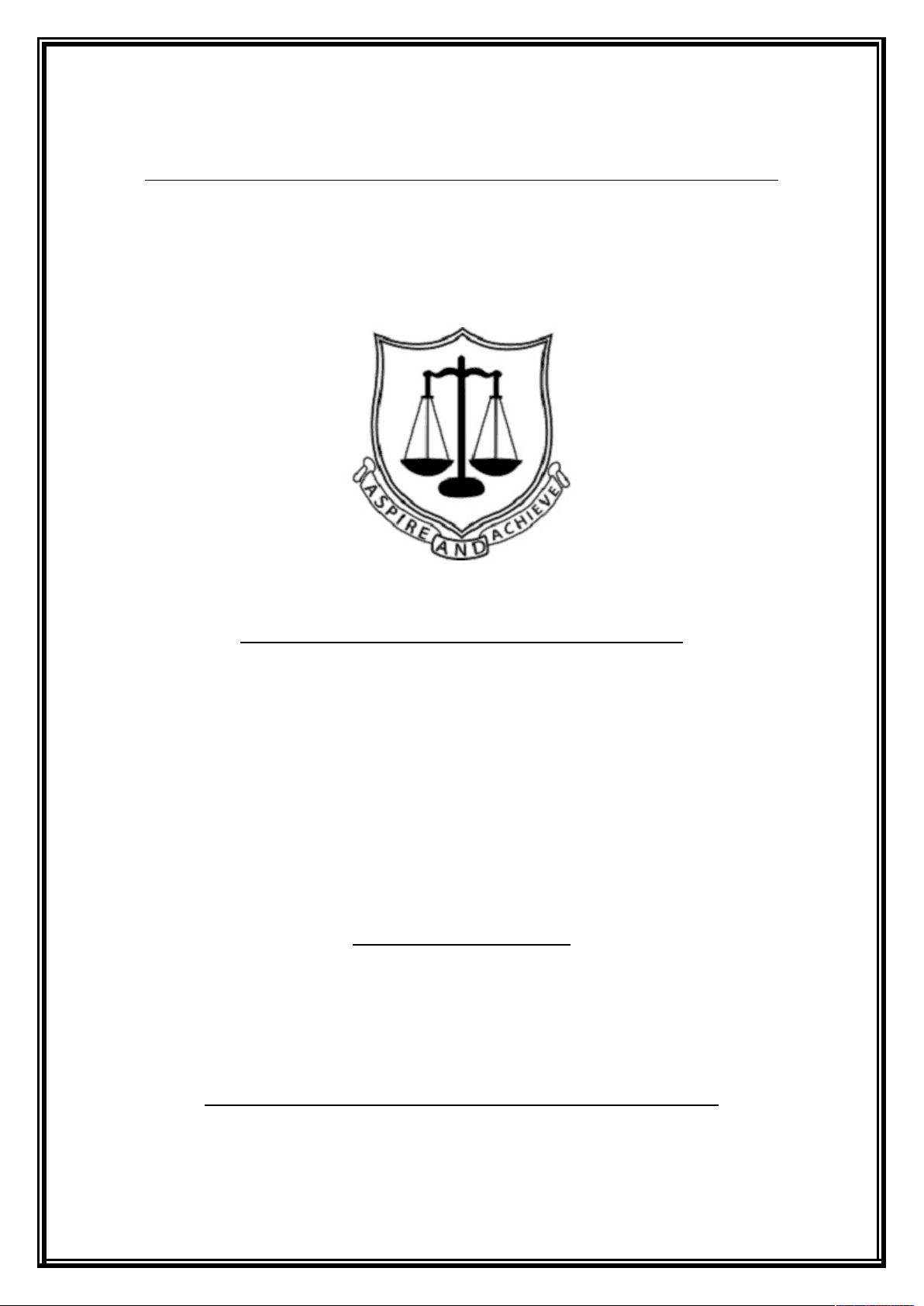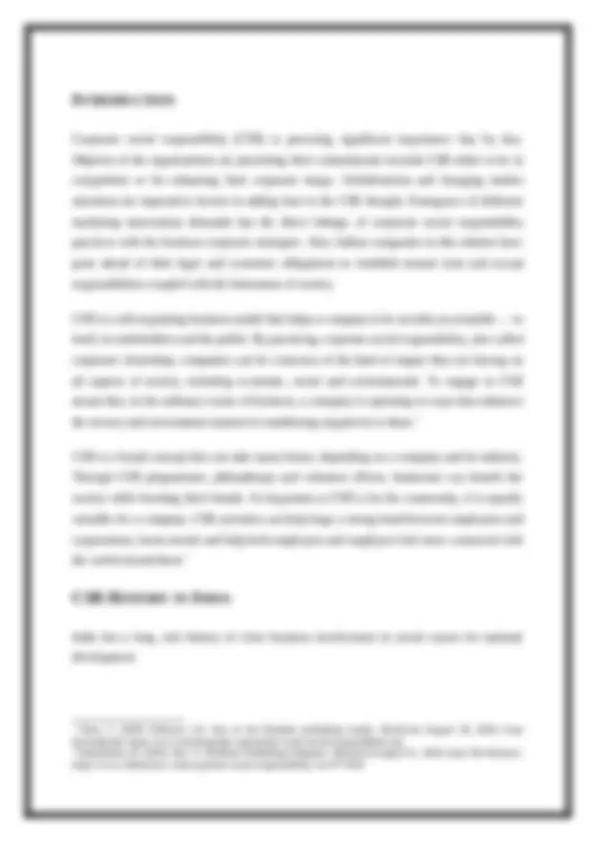









Study with the several resources on Docsity

Earn points by helping other students or get them with a premium plan


Prepare for your exams
Study with the several resources on Docsity

Earn points to download
Earn points by helping other students or get them with a premium plan
Community
Ask the community for help and clear up your study doubts
Discover the best universities in your country according to Docsity users
Free resources
Download our free guides on studying techniques, anxiety management strategies, and thesis advice from Docsity tutors
corporate social responsibility
Typology: Summaries
1 / 13

This page cannot be seen from the preview
Don't miss anything!








It is certified that the project work presented in the report entitled “CORPORATE SOCIAL RESPONSIBILITY IN COVID-19” is the result of my original research work. All the ideas and references have been duly acknowledged. s Name: Yashvardhan Singh Roll No.: 1922
Corporate social responsibility (CSR) is procuring significant importance day by day. Majority of the organizations are presenting their commitments towards CSR either to be in competition or for enhancing their corporate image. Globalizations and changing market situations are imperative factors in adding heat to the CSR thought. Emergence of different marketing innovations demands has the direct linkage of corporate social responsibility practices with the business corporate strategies. Also, Indian companies in this relation have gone ahead of their legal and economic obligations to establish mutual trust and accept responsibilities coupled with the betterment of society. CSR is a self-regulating business model that helps a company to be socially accountable — to itself, its stakeholders and the public. By practicing corporate social responsibility, also called corporate citizenship, companies can be conscious of the kind of impact they are having on all aspects of society, including economic, social and environmental. To engage in CSR means that, in the ordinary course of business, a company is operating in ways that enhances the society and environment instead of contributing negatively to them.^1 CSR is a broad concept that can take many forms, depending on a company and its industry. Through CSR programmes, philanthropy and volunteer efforts, businesses can benefit the society while boosting their brands. As important as CSR is for the community, it is equally valuable for a company. CSR activities can help forge a strong bond between employees and corporations; boost morale and help both employees and employers feel more connected with the world around them.^2
India has a long, rich history of close business involvement in social causes for national development. (^1) Chen, J. (2020, February 22). Part of the Dotdash publishing family. Retrieved August 28, 2020, from Investopedia: https://www.investopedia.com/terms/c/corp-social-responsibility.asp (^2) Edmondson, B. (2020, July 7). DotDash Publishing Company. Retrieved August 31, 2020, from The Balance: https://www.thebalance.com/corporate-social-responsibility-csr-
Listed companies in India spent Rs 10,000 crore in various programmes — ranging from educational programmes, skill development, social welfare, healthcare and environment conservation. The Prime Minister’s Relief Fund saw an increase of 139 per cent in CSR contribution over last one year (2019-20). The education sector received the maximum funding (38 per cent of the total), followed by hunger, poverty and healthcare (25 per cent), environmental sustainability (12 per cent) and rural development (11 per cent). Programmes such as technology incubators, sports, armed forces, inequality-reduction saw negligible spends.^6
The COVID-19 pandemic has upended life as we know it. It has now become the moral responsibility of corporates to come forward and contribute to rebuilding India in this hour of need. Covid-19 related expenses that qualify as CSR spend under the Indian corporate law are as follows: Contribution to PM CARES FUND Contribution to State Disaster Management Authority to combat COVID 19 Creation of health infrastructure for Covid care Establishment of medical oxygen generation and storage plants Manufacturing and supply of oxygen concentrators, ventilators, cylinders, and other medical equipment for countering Covid- Setting up of a makeshift hospital or temporary Covid care facility Eradicating hunger, poverty and malnutrition, promoting healthcare including preventive healthcare and sanitation via also contribution to the Swach Bharat Kosh set-up by the Central Government for the promotion of sanitation and for making available safe drinking water Disaster management, including relief, rehabilitation, and reconstruction activities (^6) Associates, D. S. (2020, March 23). Dezan Shira and Associates. Retrieved August 29, 2020, from India Briefing: https://www.india-briefing.com/news/corporate-social-responsibility-india-5511.html/
he Ministry of Corporate Affairs circular dated June 18, 2014 stated that items in Schedule VII are broad-based and may be interpreted liberally. According to Section 135 of Companies (CSR) Rules, 2014 and Schedule VII of Companies Act 2013: Every company with a net worth of Rs 500 crore or more or turnover of Rs 1,000 crore or more or net profit of Rs 5 crore or more during the immediate preceding financial year, must have a CSR committee and spend at least 2 per cent of average net profits earned during three immediate preceding financial years to CSR activities In the present era of COVID-19, the Government of India is inspiring companies to provide social support. According to a March 23, 2020 Ministry of Corporate Affairs circular, all expenditures incurred on activities related to COVID-19 would be added as permissible avenues for CSR expenditure. Funds may be spent for various activities related to COVID-19, under the following items of Schedule VII: Eradicating hunger Poverty Malnutrition promoting healthcare, including preventive healthcare Sanitation, including contribution to the Swachh Bharat Kosh set up by the Centre for promoting sanitation and making available safe drinking water Disaster management, including relief, rehabilitation and reconstruction activities Further, A general circular (No. 21/2014, dated June 18, 2014) mentioned that the items in Schedule VII are broad-based and may be interpreted liberally for the purpose of donations being made with respect to COVID 19. This announcement from the ministry was welcomed by Corporate India. It created a win-win situation for companies with existing CSR obligation and funds at disposal who wanted to contribute to relief and meet statutory requirements of The Companies Act at the same time.
Expenses incurred to provide free resources As we know, the Companies Act obligates certain companies to spend money on CSR activities. Now with the introduction of new provisions, there was ambiguity on whether the company needs to spend the amount in cash or kind. There is no restriction on spending in cash or kind, but the prime importance is given to the word 'spend'. The government clarified that any donation made by the company out of free company resources already held by them cannot be termed as a CSR expenditure. Actual spending is required for it to qualify as CSR expenditure. Let's take an example to understand it better. A company is donating clothes to poor people. The clothes were obtained free of cost by the company through some other means. Here, as the clothes have been obtained free of cost by the company, it cannot be termed a CSR expenditure under corporate laws. However, if the company is incurring some incidental expenses on the distribution of clothes, it might claim this up to 5% of their total CSR expenditure. The legislation allows manufacturing and supply of specified medical equipments as a CSR activity in the recent amendments. Thereby, if the supply of such products is made, it would be construed as a CSR activity. Administrative expenditure Under the amended rules, administrative expenses are only allowed to the extent of 5% of the total CSR expenditure of the company for the financial year. Administrative overheads have been defined as expenses directly incurred by the company on 'general management and administration' of CSR functions in the company. Also, the expenses incurred by the company on designing, implementation, monitoring, and evaluation of a particular Corporate Social Responsibility project will not be included as part of the administrative overheads but as a CSR expenditure. Let's understand the issue with a few examples.
A company used its factory premises to build a temporary Covid care facility. During this period, it incurs overhead expenses like rent, electricity, water expenses, etc. Such payments fall in the nature of general management and administration. A company can utilize up to 5% of the total expenditure in CSR (other than the overheads) as administrative expenses. Although 5% expenditure is allowed, authorities might still disagree on the fixed expenses as CSR expense as it is not a CSR specific expense but a regular business expense. Salary paid to employees and directors on duty at the care facilities is also a contractual and statutory obligation. As the employees are dependent on the company for their day-to-day expenses, it becomes a moral responsibility as well. Thereby payment of such salaries too may not be construed as a CSR expenditure even when the salary is paid for the care facility. The company hires new doctors, consultants and other medical staff in order to take care of the patients. If emoluments to these employees are being exclusively paid for the implementation and monitoring of the CSR project; it would be allowed as a CSR expenditure. R&D spend on vaccines, medicines and medical equipment Expenditures in the normal course of businesses are excluded from the scope of CSR activities. However, any company engaged in research and development activity of new vaccine, drugs and medical devices in their normal course of business may undertake research and development activity of new vaccine, drugs and medical devices related to Covid-19 for financial years 2020-21, 2021-22, 2022-23 provided such research is carried out in collaboration with any institute or organization mentioned in Schedule VII and separately disclosed in the Board's Report. But now, research and development of vaccines, etc., have almost come to the completion stage, and not much expenditure will be incurred in FY 2021-22 and 2022-23. It is suggested that government should allow a weighted deduction for FY 2020-21 in order to benefit the companies already in business.
From the above findings, it can be concluded that companies in the sector play an outstanding role to bring out the relationship between the organisation and the society. Companies are striving to benefit the society in every manner. It can also be concluded that there’s more media coverage of events but actual implementation of activities is somehow lacking. Most companies are building customer loyalty, reputation, employee motivation, brand value and employee-retention by CSR activities. It will be wise if the companies focus on areas the society need by understanding them. This will, in turn, ensure universal advancement of the country.